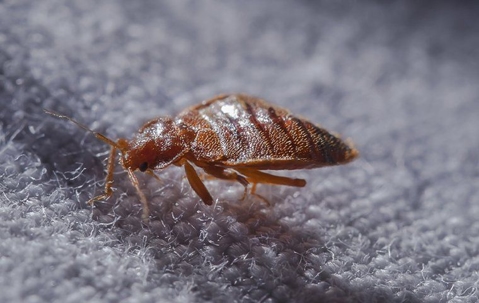Bed Bug Exterminator Houston Treatment: Specialized Techniques for Elimination
Wiki Article
Effective Insect Control Actions to Secure Your Garden and Plants
In the realm of horticulture, the harmony of a well-tended garden can often be interfered with by undesirable bugs that endanger the wellness and vigor of plants. As gardeners strive to keep a flourishing exterior area, the obstacle of pest control becomes a vital aspect of their horticultural endeavors. Executing effective insect control measures not only safeguards the yard's visual appeal however likewise plays a crucial role in protecting the plants' health. By discovering an array of techniques that include all-natural repellents, helpful bugs, friend growing, DIY solutions, and environmentally-friendly pesticides, garden enthusiasts can navigate the elaborate world of bug management with accuracy and care.All-natural Pest Repellents

Another reliable natural insect repellent is diatomaceous earth, a fine-grained compound made from fossilized water organisms. Diatomaceous earth jobs by physically hurting pests with its rough structure, making it an outstanding choice for regulating pests like slugs, beetles, and caterpillars. Furthermore, planting buddy plants like marigolds, lavender, or basil can aid drive away pests because of their strong fragrances or all-natural chemical substances.
Beneficial Insects for Bug Control

Another advantageous pest is the parasitic wasp, which lays its eggs inside bug bugs, at some point eliminating them. Ground beetles are excellent for regulating caterpillars, snails, and slugs. Hoverflies, usually mistaken for bees due to their comparable appearance, feed upon aphids, thrips, and caterpillars.
To bring in helpful insects to your garden, you can grow a diverse series of blooming plants, such as dill, fennel, and yarrow, which give nectar and plant pollen for adult insects. Additionally, avoid using broad-spectrum chemicals that can hurt both damaging and advantageous insects. By producing an inviting atmosphere for these useful pests, you can reduce the requirement for chemical pesticides and advertise a much healthier, a lot more well balanced yard environment.
Buddy Planting Strategies
When intending to boost the performance of valuable insects in your garden for natural bug control, taking into consideration companion planting strategies can further maximize the ecological community equilibrium. Companion growing includes strategically positioning specific plants following to each other to maximize their shared benefits, such as preventing pests, bring in advantageous insects, or improving nutrition uptake - bed bug exterminator houston near me. One preferred instance is growing marigolds alongside tomatoes to drive away nematodes and various other hazardous insects while additionally bring in pollinatorsPlanting trap crops like nasturtiums can divert bugs away from your main plants, serving as sacrificial plants that safeguard your useful produce. By applying friend planting top article strategies, you can create a diverse and harmonious garden ecosystem that naturally regulates insects while advertising plant health and performance.
Do It Yourself Pest Control Solutions
To effectively handle insects in your garden, carrying out do-it-yourself pest control services can be a cost-efficient and environmentally friendly strategy. One common do it yourself pest control service is creating homemade insecticidal soaps by blending mild soap with water to control soft-bodied bugs like aphids, termites, and whiteflies. Additionally, presenting helpful pests such as ladybugs, lacewings, and predatory wasps can assist normally control bug populations in your yard. Setting up physical barriers like row covers or netting can also avoid pests like caterpillars from harming your plants.One more reliable technique is making use of diatomaceous planet, a natural powder that can be sprinkled around plants to deter slugs, snails, and various other creeping insects. Companion planting particular natural herbs and blossoms like marigolds, basil, and lavender can assist repel parasites and draw in useful bugs. On a regular basis checking your plants for indications of pest damages and immediately eliminating any influenced locations can also prevent problems from spreading. By incorporating these do it yourself insect control services right into your gardening routine, you can protect your yard and plants without counting on rough chemicals.
Environmentally-Friendly Pesticides

Another reliable alternative is diatomaceous planet, an all-natural substance made from fossilized aquatic organisms, which can be sprayed around plants to control slugs, snails, and various other crawling insects. In addition, insecticidal soaps and oils originated from plant-based resources are helpful for controlling try this site soft-bodied pests like aphids, termites, and whiteflies.
Conclusion
In final thought, efficient pest control actions such as all-natural repellents, helpful bugs, companion growing techniques, DIY options, and environmentally-friendly pesticides are essential for additional info shielding your garden and plants. By implementing these approaches, you can stop damage brought on by bugs and preserve a healthy and balanced and growing yard environment. It is very important to consider the lasting effect of utilizing chemicals and choose more lasting and eco-friendly choices to make sure the health and wellness and wellness of your plants and the environment.Report this wiki page